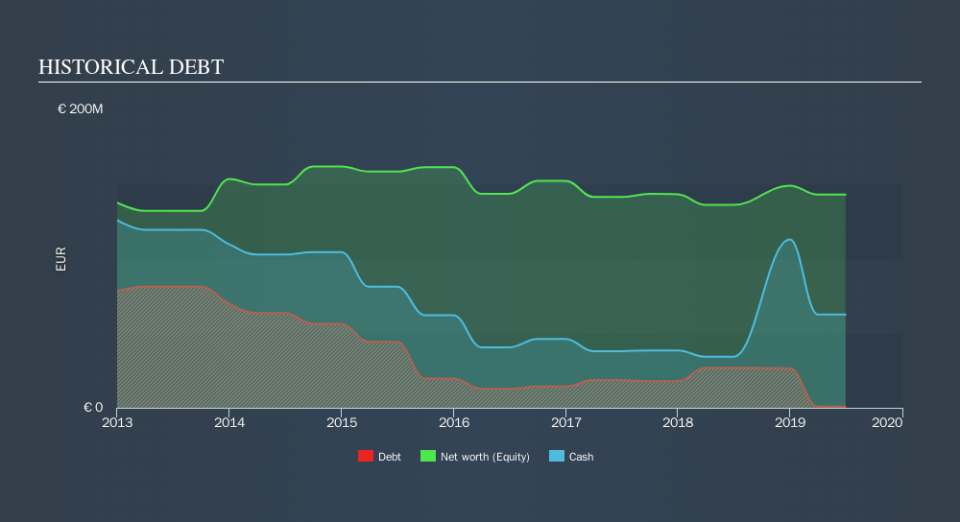Sword Group (EPA:SWP) Could Easily Take On More Debt

The external fund manager backed by Berkshire Hathaway's Charlie Munger, Li Lu, makes no bones about it when he says 'The biggest investment risk is not the volatility of prices, but whether you will suffer a permanent loss of capital.' It's only natural to consider a company's balance sheet when you examine how risky it is, since debt is often involved when a business collapses. We can see that Sword Group S.E. (EPA:SWP) does use debt in its business. But should shareholders be worried about its use of debt?
What Risk Does Debt Bring?
Debt assists a business until the business has trouble paying it off, either with new capital or with free cash flow. Ultimately, if the company can't fulfill its legal obligations to repay debt, shareholders could walk away with nothing. While that is not too common, we often do see indebted companies permanently diluting shareholders because lenders force them to raise capital at a distressed price. Of course, plenty of companies use debt to fund growth, without any negative consequences. The first step when considering a company's debt levels is to consider its cash and debt together.
Check out our latest analysis for Sword Group
What Is Sword Group's Debt?
You can click the graphic below for the historical numbers, but it shows that Sword Group had €766.0k of debt in June 2019, down from €26.8m, one year before. But it also has €62.6m in cash to offset that, meaning it has €61.9m net cash.
A Look At Sword Group's Liabilities
According to the last reported balance sheet, Sword Group had liabilities of €70.6m due within 12 months, and liabilities of €32.1m due beyond 12 months. On the other hand, it had cash of €62.6m and €70.3m worth of receivables due within a year. So it can boast €30.3m more liquid assets than total liabilities.
This short term liquidity is a sign that Sword Group could probably pay off its debt with ease, as its balance sheet is far from stretched. Simply put, the fact that Sword Group has more cash than debt is arguably a good indication that it can manage its debt safely.
Better yet, Sword Group grew its EBIT by 103% last year, which is an impressive improvement. That boost will make it even easier to pay down debt going forward. There's no doubt that we learn most about debt from the balance sheet. But it is future earnings, more than anything, that will determine Sword Group's ability to maintain a healthy balance sheet going forward. So if you're focused on the future you can check out this free report showing analyst profit forecasts.
But our final consideration is also important, because a company cannot pay debt with paper profits; it needs cold hard cash. While Sword Group has net cash on its balance sheet, it's still worth taking a look at its ability to convert earnings before interest and tax (EBIT) to free cash flow, to help us understand how quickly it is building (or eroding) that cash balance. In the last three years, Sword Group's free cash flow amounted to 45% of its EBIT, less than we'd expect. That weak cash conversion makes it more difficult to handle indebtedness.
Summing up
While we empathize with investors who find debt concerning, you should keep in mind that Sword Group has net cash of €62m, as well as more liquid assets than liabilities. And it impressed us with its EBIT growth of 103% over the last year. So we don't think Sword Group's use of debt is risky. Another positive for shareholders is that it pays dividends. So if you like receiving those dividend payments, check Sword Group's dividend history, without delay!
If you're interested in investing in businesses that can grow profits without the burden of debt, then check out this free list of growing businesses that have net cash on the balance sheet.
We aim to bring you long-term focused research analysis driven by fundamental data. Note that our analysis may not factor in the latest price-sensitive company announcements or qualitative material.
If you spot an error that warrants correction, please contact the editor at editorial-team@simplywallst.com. This article by Simply Wall St is general in nature. It does not constitute a recommendation to buy or sell any stock, and does not take account of your objectives, or your financial situation. Simply Wall St has no position in the stocks mentioned. Thank you for reading.

